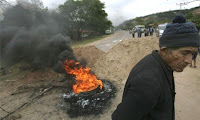 Venezuela has become less democratic under the rule of Hugo Chavez according to a report issued by Human Rights Watch (HRW).
Venezuela has become less democratic under the rule of Hugo Chavez according to a report issued by Human Rights Watch (HRW).A weakened justice system, press harassment, and political discrimination were just a few of the problems faced in Venezuela under nearly a decade of Chavez’ rule according to HRW Americas director José Miguel Vivanco. At a press conference yesterday in Caracas, Vivanco spoke out against the “weakening of democratic institutions” under Chavez and made several recommendations to the Venezuelan government.
The Chavez administration not only replied by criticizing Vivanco but also by kicking him out of the country hours after his press conference:
Officials in Caracas said Human Rights Watch Americas director Jose Miguel Vivanco had made unacceptable remarks against the country's institutions.
"We aren't going to tolerate any foreigner coming here to sully the dignity" of Venezuela's institutions, Foreign Minister Nicolas Maduro told state television…
Vivanco "has violated the constitution" and Venezuela's laws, Maduro said.
Both human rights campaigners had been acting at the behest of the U.S. government, the foreign minister said.
Earlier this week, HRW released a statement calling for Bolivian authorities to investigate the deaths of at least fifteen people during recent disturbances. “An independent and unbiased investigation is absolutely critical to ensuring that those responsible for these killings are brought to justice,” said Vivanco over the killings in the department of Pando.
Image- AP (“Jose Miguel Vivanco, Americas director for Human Rights Watch, listens to reporters' questions during a news conference in Caracas, Thursday, Sept. 18, 2008.”)
Sources (English)- Human Rights watch, CBC, miamiherald.com
Sources (Spanish)- unionradio.net
 Despite the recent problems in the global financial markets Brazilian President Luis Inacio Lula da Silva is not worried:
Despite the recent problems in the global financial markets Brazilian President Luis Inacio Lula da Silva is not worried:



















